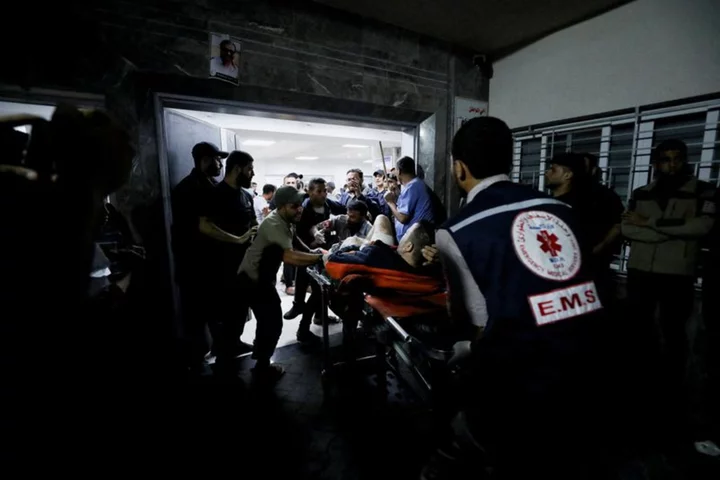By Nidal al-Mughrabi
GAZA The head of orthopedic surgery at Al-Ahli al-Arabi Hospital in Gaza, Fadel Naim, had just finished a procedure when he heard a huge explosion and his department filled with people screaming for help.
"People came running into the surgery department screaming help us, help us, there are people killed and wounded inside the hospital," he said. He found the hospital full of dismembered bodies and wounded people.
"We tried to save whoever could be saved but the number was too great for the hospital team," he said.
Tuesday's explosion killed hundreds of Palestinians and wrecked a diplomatic mission by U.S. President Joe Biden, who arrived in Israel on Wednesday to calm the region but was snubbed by Arab leaders who called off an emergency summit.
Palestinian officials blamed an Israeli air strike for the blast. Israel said the blast was caused by a failed rocket launch by the Palestinian Islamic Jihad militant group, which denied blame.
Doctor Ibrahim Al-Naqa was proud of the 100-year-old baptist hospital. In a region of conflict, it welcomed all faiths, offering patients a church and a mosque.
On Tuesday, people seeking shelter from the fiercest fighting between the Israeli military and the Palestinian militant group Hamas in decades walked into the hospital to their deaths.
Blood stained the walls and the ground in what was normally a peaceful place that helped patients recover.
"This place created a safe haven for women and children, those who escaped the Israeli bombing into this hospital, those who saw this place as a safe haven," said Naqa.
"Without warning this hospital was targeted. We don't know what the shell is called but we saw the results of it when it targeted children and ripped their bodies into pieces."
REGION IN CRISIS
The death toll from the hospital explosion was by far the highest of any single incident in Gaza during the current violence, and saw protests erupt in the occupied West Bank and the wider region, including in Jordan and Turkey.
The blast inflamed a region in crisis after Hamas, which controls the Gaza Strip, carried out a cross-border rampage against communities in southern Israel on Oct. 7 in which at least 1,300 people were killed and hostages were taken.
Israel responded with the heaviest ever air strikes on the blockaded Gaza Strip and has massed troops and tanks on its border.
Israel's military on Wednesday published what it described as evidence that a misfired Palestinian rocket caused the hospital explosion. Hamas said it was an Israeli air strike and an Islamic Jihad spokesman rejected Israeli accusations as "cover to justify carrying out its massacres against Palestinian civilians".
Before Tuesday's blast, health authorities in Gaza said at least 3,000 people had died in 11 days of Israeli bombardment.
The scenes of destruction from the hospital were horrific even by the standards of the past days, which have confronted the world with relentless images, first of Israelis slaughtered in their homes and then of Palestinian families buried under rubble from Israel's retaliatory strikes.
A Gaza civil defence chief gave a death toll of 300 at the hospital, while health ministry sources put it at 500. Bodies were still being pulled from the rubble on Wednesday.
"The massacre carried out by the Israeli occupation at the Baptist Hospital is the massacre of the 21st century and it is a continuation of its crimes since the Nakba of our people in 1948," said Salama Marouf, head of the Hamas government media office.
"Nakba", or "catastrophe", refers to when many Palestinians fled or were forced from their homes during the 1948 war that accompanied Israel's creation.
(Writing by Michael Georgy; Editing by Janet Lawrence)

